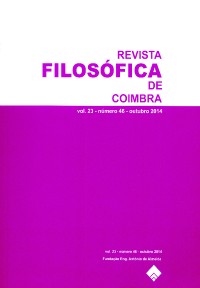Please use this identifier to cite or link to this item:
https://hdl.handle.net/10316.2/35582| DC Field | Value | Language |
|---|---|---|
| dc.contributor.author | Gonçalves, Márcia C. F. | - |
| dc.date.accessioned | 2015-01-15T11:38:05Z | |
| dc.date.accessioned | 2020-09-24T17:44:24Z | - |
| dc.date.available | 2015-01-15T11:38:05Z | |
| dc.date.available | 2020-09-24T17:44:24Z | - |
| dc.date.issued | 2014 | - |
| dc.identifier.issn | 0872-0851 | - |
| dc.identifier.uri | https://hdl.handle.net/10316.2/35582 | - |
| dc.description.abstract | Este artigo pretende demonstrar a origem de algumas teses da filosofia da natureza de Schelling a partir de seu diálogo crítico com a filosofia transcendental de Fichte e Kant. Em seus primeiros ensaios, Schelling ainda tenta defender a superioridade do espírito sobre a natureza, na medida em que descreve a formação da matéria a partir de um desdobramento interior do espírito. O artigo pretende mostrar porque a tese de Schelling sobre a subjetividade ou espiritualidade imanente à natureza, descartada no início de seu desenvolvimento filosófico, constitui o ponto de virada para a fundação de sua filosofia da natureza. | por |
| dc.description.abstract | Der Artikel beabsichtigt zu zeigen, daß die Herkunft einiger Thesen der Naturphilosophie Schellings liegt in seinem kritischen Dialog mit der Transzendentalphilosophie Kants und Fichtes. In seinen frühen Essays versucht Schelling noch die Überlegenheit des Geistes über die Natur zu verteidigen, indem er die Bildung der Materie aus einer inneren Entwicklung des Geistes beschreibt. Der Artikel soll also zeigen, warum Schellings These einer Subjektivität bzw. Geistigkeit innerhalb der Natur, die in seiner frühen philosophischen Entwicklung verworfen ist, der Wendepunkt für die Gründung seiner Naturphilosophie aufmacht. | deu |
| dc.language.iso | por | - |
| dc.publisher | Faculdade de Letras da Universidade de Coimbra, Instituto de Estudos Filosóficos | - |
| dc.subject | Schelling | - |
| dc.subject | Natur | - |
| dc.subject | Materie | - |
| dc.subject | Geist | - |
| dc.subject | Schelling | por |
| dc.subject | Natureza | por |
| dc.subject | Matéria | por |
| dc.subject | Espírito | por |
| dc.title | A constução do conceito schellinguiano de natureza a partir do diálogo crítico com a Filosofia transcendental | por |
| dc.type | article | - |
| uc.publication.collection | Revista Filosófica de Coimbra vol. 23, nº 46 | - |
| uc.publication.firstPage | 317 | - |
| uc.publication.issue | 46 | - |
| uc.publication.lastPage | 348 | - |
| uc.publication.location | Coimbra | - |
| uc.publication.journalTitle | Revista Filosófica de Coimbra | - |
| uc.publication.volume | 23 | por |
| dc.identifier.doi | 10.14195/0872-0851_46_4 | - |
| uc.publication.section | Artigos | - |
| uc.publication.orderno | 5 | - |
| uc.publication.area | Artes e Humanidades | - |
| uc.publication.manifest | https://dl.uc.pt/json/iiif/10316.2/35582/242294/manifest?manifest=/json/iiif/10316.2/35582/242294/manifest | - |
| uc.publication.thumbnail | https://dl.uc.pt/retrieve/11657833 | - |
| item.grantfulltext | open | - |
| item.fulltext | With Fulltext | - |
| Appears in Collections: | Revista Filosófica de Coimbra | |
Files in This Item:
| File | Description | Size | Format | |
|---|---|---|---|---|
| rfc46_artigo5.pdf | 7.02 MB | Adobe PDF |  |
Items in DSpace are protected by copyright, with all rights reserved, unless otherwise indicated.
